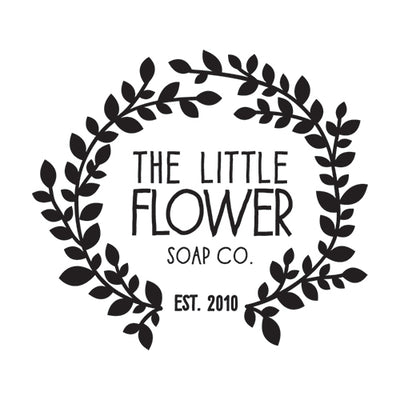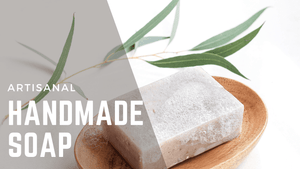Artisanal soap has gained significant admiration. This is beacause of its many benefits which we will cover in this post. There is a wholesome and unique craftsmanship involved in its production. This article explores the basics of artisanal soap, its key ingredients and the advantages it offers for your skin. We will also review ways to choose the right soap and talk about the environmental impact of artisanal soap.

Basics of Artisanal Soap
Unlike commercial soaps which are mass produced in a factory, artisanal soap is handmade in small batches. Every bar of healthy skin soap is carefully made with pride by a small business owner who takes pride in their craft. Minding each detail during this process contributes to overall quality.
Artisanal soap is typically natural and handmade offering a gentler alternative to conventional bar soap. Usually, it’s made with plant oils (olive, coconut, or both). possibly shea butter or in our case tallow. And it is scented naturally with a blend of essential oils and botanical extracts. All these ingredients give the soap its rich lather, creamy texture, delightful scent and skin-nourishing properties.
The Key Ingredients in Artisanal Soap
The ingredients used in artisanal soap are what gives it an amazing reputation for being superior to store-bought soaps. Olive oil, a common component in handmade soaps, is moisturizing as is coconut oil which also adds richness. Tallow provides hydration to soothe dry skin and makes for a thick lather that protects for shaving. Essential oils are carefully chosen for their specific benefits. Most importantly glycerine is retained in handmade soap a SUPER skin softening ingredient that mass manufacturers syphon of to resell. Glycerine is very valuable for its skin softening abilities. If you've ever used a bar of soap from the farmers market and wondered why it left your skin so much softer than that bar of irish spring you grew up using.. glycerine is the reason!
When creating artisanal soap, ingredients are measured carefully. The precise ratios are taken into consideration. This results in a perfectly balanced soap. The mixture is poured into molds. It sets and hardens over time. When the soap has cured, each bar is hand-cut. Some artisans will go the extra mile, stamping their logo.

The Benefits of Artisanal Soap
Nourishing Natural Ingredients
Artisanal soap typically contains natural oils and butters that nourish the skin. Unlike store bought soaps these all natural bars help retain the skins natural moisture and leave it feeling soft. Natural essential oils in artisanal soaps boast many great qualities like being antimicrobial, anti-bacterial or having therapeutic scents.
Avoiding Harmful Chemicals Found in Commercial Options
Commercial soaps often have synthetic fragrances. They contain harsh chemicals or additives. These compounds can irritate the skin. They may also contain sulfates or parabens. These have been linked to skin irritation and worse toxin absorption which can make its way through your blood stream to your brain and effect your ability to focus, problem solve, and balance your hormones. Artisanal soaps are typically free from these harsh substances. They’re a much safer, natural option.

The Craft of Soap Making
The handmade soap-making process is an heirloom tradition, like many other crafts, passed down from generation to generation. These days, it combines old techniques with modern innovations creating extra special and widely available artisanal soaps. Traditional soap-making can be a form of art. A combination of oils first gets mixed with an alkaline solution commonly known as lye. This mixture undergoes a chemical reaction called saponification, resulting in soap. The soap is then poured into molds. There, it cures for several days. During this time, excess moisture evaporates, hardening the soap.
Modern Innovations in Soap Making
The traditional process is cherished. However, modern soap crafting techniques have emerged as well. They aim to enhance the art of handmade soap. Some of them include incorporating natural clays, botanicals, or exfoliants to the soap. Artisans experiment with scent combinations with essential oils. They also create appealing designs with vibrant colors. Soap makers can achieve swirled designs. They carefully layer different colored soap batters. Then, they swirl them together using different tools.

The Environmental Impact of Artisanal Soap
Artisanal soap is also a sustainable option. One that minimizes harm to the planet. Its producers often prioritize sustainability. They do this by using responsibly sourced ingredients, also adding eco-friendly packaging. Many producers are mindful of reducing waste so, they go for biodegradable wrapping or reusable packaging. Unlike commercial options, artisanal soap is biodegradable. It breaks down naturally, which is one of the many natural soap benefits. All without leaving harmful residues that can pollute water sources or even harm wildlife.
To conclude, artisanal soap offers a healthy choice. Both for your skin and the planet. It has natural ingredients. Nourishing properties. It avoids harmful chemicals. The art and craft provide a unique experience. By choosing artisanal soap, you prioritize your skin's health. Also, you contribute to sustainable options. We are biased since we make natural soap for a living but I hope you will try our soaps and notice the value now that you've read this post!

